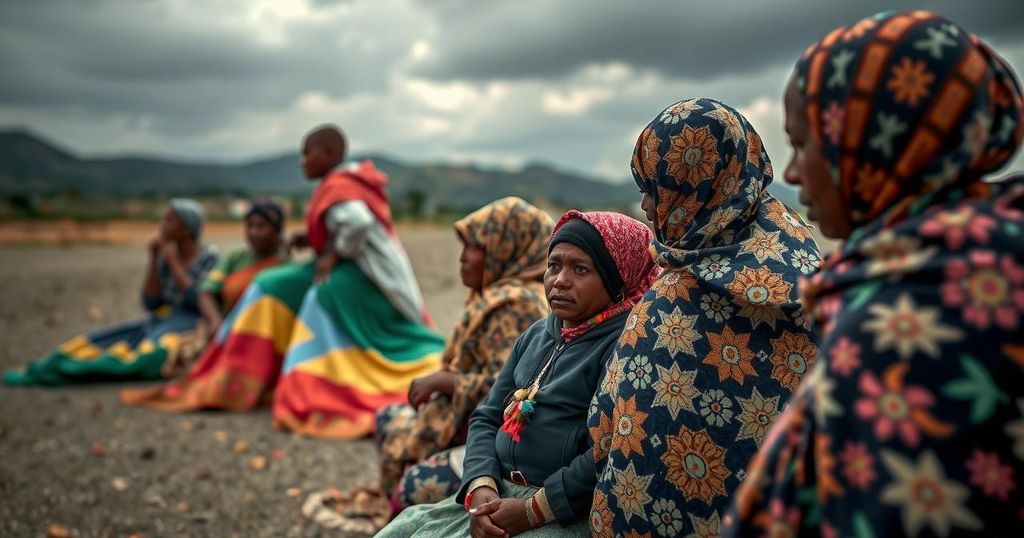Sudanese refugees in Ethiopia’s Amhara region are at grave risk due to escalating violence between government forces and Fano militias. A report by Human Rights Watch highlights ongoing abuses, including forced labor and attacks on refugee camps, underscoring the urgent need for protection and humanitarian assistance for over 90,000 refugees who have fled conflict in Sudan since April 2023. Amid complaints of inadequate support and alarming security conditions, the international community is called upon to ensure the welfare of these vulnerable populations.
Sudanese refugees residing in the Amhara region of Ethiopia face increasing threats to their safety amidst ongoing conflicts between Ethiopian government forces and Fano militias, as detailed in a recent report by Human Rights Watch (HRW). This report, released yesterday, compiles incidents of violence, abduction, and forced labor experienced by these refugees from April 2023 to September 2024, highlighting the urgent need for protection and humanitarian assistance. According to Laetitia Bader, the deputy Africa director at HRW, refugees fleeing severe abuses in Sudan are now at heightened risk in Ethiopia, stating, “Sudanese refugees in Ethiopia have been the target of abuses for more than a year by various armed actors.” The situation originated from long-standing tensions in the region, exacerbated by intensified clashes that erupted in August 2023 between the military and local militias. Reports indicate that refugees have faced robberies, beatings, and even murder due to their vulnerability in this conflict-prone area. Camps such as Awlala and Kumer, housing thousands of displaced Sudanese, have been described as insecure, with one resident recalling guerrilla violence: “You would many see young men crossing the camp, carrying guns. […] We were trapped in the middle.” Protests have been ongoing, particularly in response to insufficient provisions and safety concerns. In April 2024, refugees marching toward the UNHCR office were obstructed by police, forcing them to seek temporary refuge in nearby forests, where they endured continued assaults. The escalation of conflict reached a troubling peak in July 2024, with deadly attacks on camp security, leaving refugees with diminished protection. Additionally, the report underscores disturbing instances of forced labor, with numerous refugees compelled to work for armed groups in exchange for safety. As local tensions persisted and security conditions worsened, the UNHCR was forced to close key camps, relocating refugees to the Aftit camp under threatening circumstances. Families were fractured as security forces pressured refugees into returning to Sudan, raising questions about the voluntary nature of such returns. Amidst these precarious conditions, the Ethiopian government has denied claims of forced relocations, maintaining a position against refugee abuse. Yet, HRW advocates for the Ethiopian authorities to uphold their duty to safeguard refugees, calling for interventions to address these alarming concerns. Since the onset of the conflict in Sudan, Ethiopia has become a refuge for over 90,000 Sudanese individuals, amplifying the urgency of the situation. The HRW report titled, “Ethiopia: Fighting, Abuses Putting Sudanese Refugees at Risk,” can be accessed on the HRW website.
The ongoing conflict in Sudan, particularly since April 2023, has triggered a mass exodus of refugees into neighboring Ethiopia, where prevailing civil unrest compounds their plight. The Amhara region, which hosts significant populations of Sudanese refugees, has seen escalated violence due to clashes between Ethiopian federal forces and local armed militias, primarily the Fano. Historical ethnic tensions between local communities, namely the Amhara and Qemant, further exacerbate the security dynamics, resulting in deteriorating conditions for the refugees. Human Rights Watch’s report seeks to spotlight the vulnerability of these individuals, who, having fled violence in Sudan, are now subject to severe risks and human rights violations in Ethiopia.
In summary, as detailed in the HRW report, Sudanese refugees in Ethiopia’s Amhara region are currently facing severe risks due to violence, forced labor, and systemic insecurity. Despite having sought sanctuary from violent conflict, they find themselves targeted by armed groups amid renewed hostilities in the region. The pressing need for enhanced protection and humanitarian support is crucial, as Ethiopia continues to grapple with internal security issues that directly threaten the safety and rights of these vulnerable populations. The international community remains urged to hold relevant authorities accountable and advocate for the welfare of those in dire conditions.
Original Source: www.dabangasudan.org






